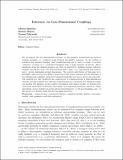Inference via low-dimensional couplings
Author(s)
Spantini, Alessio; Bigoni, Daniele; Marzouk, Youssef M
DownloadPublished version (2.379Mb)
Terms of use
Metadata
Show full item recordAbstract
We investigate the low-dimensional structure of deterministic transformations between random variables, i.e., transport maps between probability measures. In the context of statistics and machine learning, these transformations can be used to couple a tractable “reference” measure (e.g., a standard Gaussian) with a target measure of interest. Direct simulation from the desired measure can then be achieved by pushing forward reference samples through the map. Yet characterizing such a map—e.g., representing and evaluating it—grows challenging in high dimensions. The central contribution of this paper is to establish a link between the Markov properties of the target measure and the existence of low-dimensional couplings, induced by transport maps that are sparse and/or decomposable. Our analysis not only facilitates the construction of transformations in high-dimensional settings, but also suggests new inference methodologies for continuous non-Gaussian graphical models. For instance, in the context of nonlinear state-space models, we describe new variational algorithms for filtering, smoothing, and sequential parameter inference. These algorithms can be understood as the natural generalization—to the non-Gaussian case—of the square-root Rauch–Tung–Striebel Gaussian smoother.
Date issued
2018-07Department
Massachusetts Institute of Technology. Department of Aeronautics and AstronauticsJournal
Journal of machine learning research
Citation
Spantini, Alessio, Daniele Bigoni and Youssef Marzouk. “Inference via low-dimensional couplings.” Journal of machine learning research, vol. 19, 2018, pp. 1-71 © 2018 The Author(s)
Version: Final published version
ISSN
1532-4435